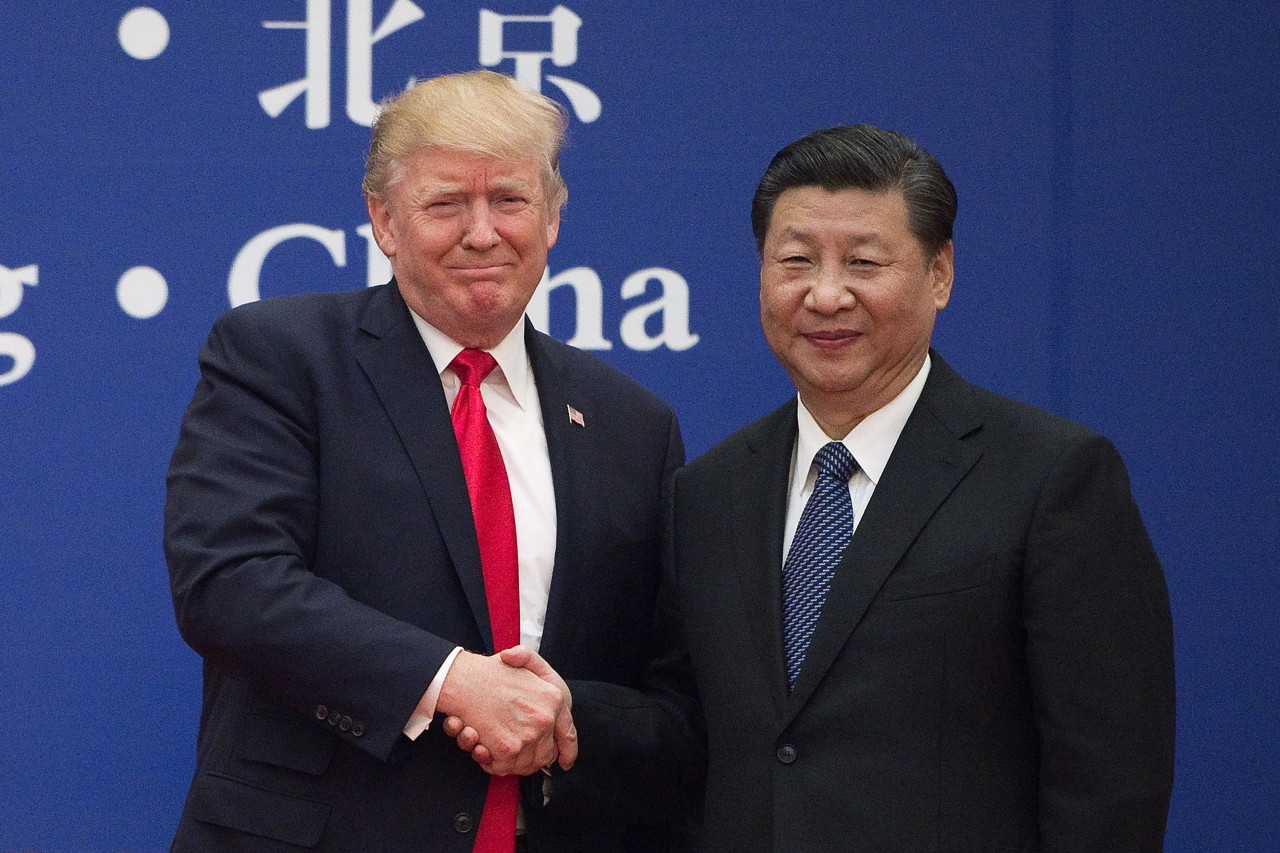Popular Reads
Top Results
Can't find what you're looking for?
View all search resultsPopular Reads
Top Results
Can't find what you're looking for?
View all search resultsWhy Beijing may want to keep Trump in the White House
Under his 'America First' banner, Trump has portrayed China as the greatest threat to the United States and global democracy.
Change text size
Gift Premium Articles
to Anyone
 In this file photo taken on Nov.8, 2017 US President Donald Trump (left) and China's President Xi Jinping shake hands during a business leaders event at the Great Hall of the People in Beijing. US President Donald Trump, who is seeking reelection on Nov 3, has regularly jolted the world with statements about other leaders that sharply deviate .from long-held diplomatic protocol.
(AFP/Nicolas Asfouri)
In this file photo taken on Nov.8, 2017 US President Donald Trump (left) and China's President Xi Jinping shake hands during a business leaders event at the Great Hall of the People in Beijing. US President Donald Trump, who is seeking reelection on Nov 3, has regularly jolted the world with statements about other leaders that sharply deviate .from long-held diplomatic protocol.
(AFP/Nicolas Asfouri)
D
onald Trump has frustrated and enraged China during a tumultuous first term, but Beijing may welcome his re-election as it scans the horizon for the decline of its superpower rival.
Relations are as icy as at any time since formal ties were established four decades ago, with China warning it does not want to be drawn into a new "Cold War" with the United States.
Under his 'America First' banner, Trump has portrayed China as the greatest threat to the United States and global democracy.
He has launched a massive trade war that has cost China billions of dollars, harangued Chinese tech firms and lay all the blame for the pandemic with Beijing.
But another Trump triumph in November may have its advantages for China as President Xi Jinping seeks to cement his nation's rise as a global superpower.
China's leadership could be handed "the opportunity to boost its global standing as a champion for globalization, multilateralism, and international cooperation," said Zhiqun Zhu, professor of political science and international relations, Bucknell University.
Trump has pulled America from a sprawling Asia-Pacific commercial deal and climate agreements, imposed billions of dollars of tariffs on Chinese goods, and withdrawn the US from the World Health Organization at the height of a global pandemic.
Where the US has retreated, Xi has stepped forward.
He has presented his country as the champion of free trade and a leader in the fight against climate change, as well as vowed to share any potential Covid-19 vaccine with poorer nations.
"A second Trump term could give China more time to rise as a great power on the world stage," Zhu said.
Philippe Le Corre, a China expert at the Harvard Kennedy School in the United States, agreed an extension of Trump's 'America First' policies would be of long-term benefit for Beijing.
"(It) partially cuts Washington off from its traditional allies," he added, and that gave China room to maneuver.
China's nationalists have openly cheered, or jeered, for Trump.
"You can make America eccentric and thus hateful for the world," Hu Xijin, editor-in-chief of the Global Times, a chest-beating nationalist paper, warned in a Tweet directed at the US president.
"You help promote unity in China."
Trump is also lampooned on China's heavily censored social media as 'Jianguo', meaning "help to build China".
Trump has undoubtedly inflicted economic and political pain on China.
"China has lost out enormously in its plan for trade and technology," said Beijing-based political analyst Hua Po.
In January the US and China signed a deal bringing a partial truce in their trade war that obliged Beijing to import an additional $200 billion in American products over two years, ranging from cars to machinery and oil to farm products.
Washington has also turned its guns on Chinese tech firms it says poses security threats, throwing the future US operations of video-sharing app TikTok - owned by Chinese parent company Bytedance - into uncertainty.
Mobile giant Huawei is also on Trump's hitlist.
The enmity also extends into defense and human rights, with Taiwan, Hong Kong and the treatment of China's Muslim Uighur minority all making waves in US.
But China may not win much relief in any of these areas if Trump loses to Democratic challenger Joe Biden.
Beijing worries that Biden is likely to renew American leadership on human rights, pressing China on issues of the Uighurs, Tibet and freedom in Hong Kong.
"Biden is likely to be tougher than Trump on human rights issues in Xinjiang and Tibet," said Zhu, of Bucknell University.
And on tech and trade - crucial flash points in the US-China rivalry - it is unclear just how much room a Biden White House would have to maneuver.
"Biden will inherit the tariffs, and I'm doubtful he would lift them unilaterally," said Bonnie Glaser, Director of the China Power Project at the Center for Strategic and International Studies.
"Beijing will probably have to concede to other US demands if it wants the tariffs lifted."
China will also have to come up with convincing arguments on data security if it is to avoid more damaging bans on its tech firms.
Washington sees Huawei - the global leader on 5G internet - as a serious security threat.
"Politically, it will be almost impossible for Biden to reverse these policies," Theresa Fallon, director of the Center for Russia Europe Asia Studies in Brussels, told AFP.
"Huawei has been on the US radar as a security threat even before the Trump presidency."









